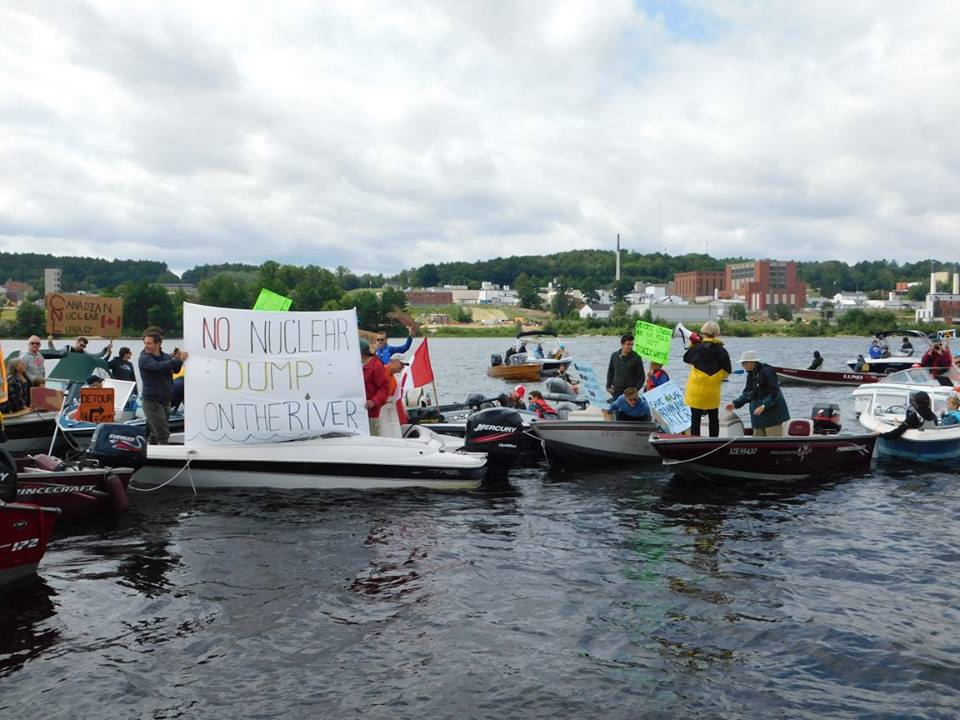Licensing hearings are set to begin today for a proposed nuclear waste disposal facility at Chalk River, 180 kilometres northwest of Ottawa.
The project, the first of its kind in Canada, would hold up to a million tonnes of radioactive and hazardous waste about a kilometre from the Ottawa River in a “near surface” facility, which is effectively a large mound.
The disposal facility — staunchly opposed by many community and environmental groups, municipalities and local First Nations — could see construction begin this year, following licensing hearings on Feb. 22 and May 31.
The nearby Kebaowek First Nation has asked for the hearings to be halted until a consultation framework between the nation and the federal regulator, the Canadian Nuclear Safety Commission, is in place.
Last week, a slew of community groups, environmentalists, municipalities and politicians from three federal parties released a statement backing the call to halt the hearings.

“We stand with Kebaowek First Nation …” noted the signatories, which include Elizabeth May of the Green Party, NDP environment and climate change critic Laurel Collins and Monique Pauzé, environment spokesperson for the Bloc Québécois.
“This has been a long-standing request [to halt the hearings] from Kebaowek First Nation, and it remains outstanding. Reconciliation and meaningful dialogue must be a starting point for any government decision affecting Indigenous lands and rights.”
The statement noted that the Assembly of First Nations and more than 140 municipalities oppose the plan for the disposal facility over worries about hazardous materials leaching into the Ottawa River that supplies drinking water to millions downstream.
Canadian Nuclear Laboratories, the private company responsible for managing and operating nuclear sites, argues the project is necessary to reduce risks of low-level radioactive waste, which is currently in temporary storage that “is not consistent with modern waste management principles.”
In its environmental assessment of the project, the company noted past waste management practices are no longer acceptable. “Specifically, the historic waste management areas lack robust containment, which in some instances has led to contamination of the surrounding environment,” it said.
The permanent disposal facility would also allow for remediation of contaminated lands and decommissioning outdated infrastructure at the Chalk River nuclear site.
Critics, however, are concerned with “serious flaws” in the environmental assessment. “When the facility leaks and eventually disintegrates, as expected, radioactive and other wastes will contaminate groundwater, wetlands and the Ottawa River, the source of drinking water for millions of people…” reads the statement asking for a halt to the licensing hearings. It noted the site has a high water table, flood risks and is prone to earthquakes.

The federal parliamentary Standing Committee on Environment and Sustainable Development is currently reviewing nuclear waste and its environmental impacts in Canada, while the auditor general is conducting an audit. Opponents of the project also argue that the licensing hearings should be delayed until these reports are complete.
Ole Hendrickson, a researcher with the Concerned Citizens of Renfrew County and Area, a community group opposed to the project, said the proposal to store radioactive and other hazardous waste above ground isn’t consistent with international best practices. “There would be issues of escape from containment, human intrusion,” he said, noting that other materials in the disposal area have the potential to draw scavengers.
The proximity of the facility to the Ottawa River also poses a risk, as even low levels of seepage of hazardous materials could expose millions of people to toxins for a long period of time, he said. “You’re just sort of adding to the environmental pollution burden that those people would be exposed to,” said Hendrickson. “That’s a big concern for a lot of downstream municipalities.”
Many opponents hope the commission will refer the project to cabinet for further consideration, or that elected officials will intervene.
Where do these nuclear power
Where do these nuclear power types even get these ideas? I mean, you could take anyone off the street at random, and tell them "I'll pay you a few grand. Take a week, do some googling, look up some articles on the requirements of nuclear storage and on the geography of different places, and come up with a place you think would be good to store nuclear waste." and they would come up with something better than anything these Ontario nuclear johnnies ever seem to have suggested.
Like at least they'd probably go for something underground, in a place that was dry, without much habitation. Really, how hard are these concepts?






Comments